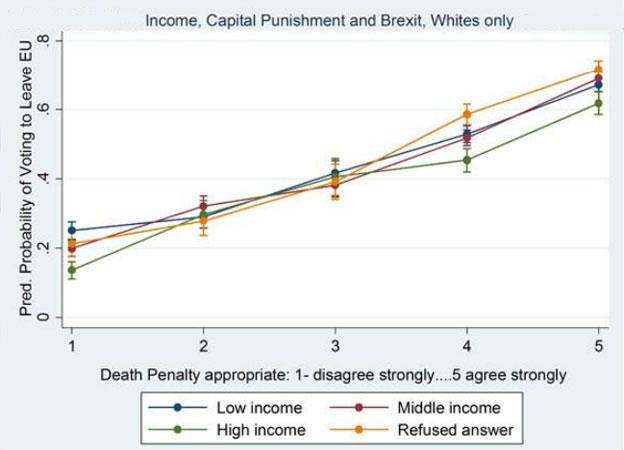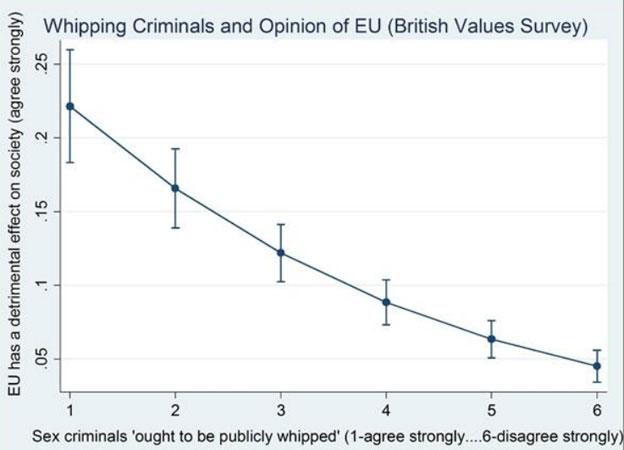The link between Brexit and the death penalty
- Published

If you know someone's social class and income, then you might think it's easy to guess how they voted in the UK's referendum on the European Union - but what you really need to know, says Alex Burton of BBC Radio 4's The Briefing Room, is their view on capital punishment.
Immediately after the vote, commentators said it was about class - about professionals living and working in big cities, especially London (who voted Remain), versus working class people in smaller towns, especially in the north of England (who voted Leave).
So you would think that if you know that someone is working class and has a low income, you'd be able to confidently guess they voted Leave. But according to Stian Westlake, Head of Research at the think tank Nesta, this is not the case.
"If you look at someone's class status and their income, and you try and use that to guess whether or not they voted Remain, it turns out it's not that much better than guesswork. It gives you around 55% accuracy, and obviously a guess would give you 50% accuracy," Westlake says.
His figures come from the British Election Study, in which around 24,000 people were asked about their voting intentions in the EU referendum.
Respondents to the survey were also questioned on their views on other things, such as the death penalty - and this provides a much better indicator of how people voted, Westlake argues.
"If you look at attitudes to questions such as, 'Do you think criminals should be publicly whipped?' or 'Are you in favour of the death penalty?' - those things are much better predictors, and you get over 70% accuracy," he says.
"To give you an idea of how good a predictor that is, if you ask someone, 'Do you think there is too much European integration?' - which you'd think is a pretty good indicator - that only gets you to the high 70s. So if you can get to 71% or 72% prediction from these questions about traditional values, then it suggests it is that, rather than income or class, that is really driving the vote for Leave."

Brexit Briefing by Prof Eric Kaufman of Birkbeck College (excerpt)
The British Election Study's internet panel survey of 2015-16 asked a sample of over 24,000 individuals about their views on [the death penalty] and whether they would vote to leave the EU. The graph below, restricted to White British respondents, shows almost no statistically significant difference in EU vote intention between rich and poor. By contrast, the probability of voting Brexit rises from around 20% for those most opposed to the death penalty to 70% for those most in favour. Wealthy people who back capital punishment back Brexit. Poor folk who oppose the death penalty support Remain.




Ben Shimshon of Britain Thinks, a company which advises businesses and political parties on how to communicate with the public, broadly agrees with Westlake. What united Leave voters in focus groups in the run-up to the referendum, he says, was support for a whole set of "traditional" values.
"They tended to value things like order, stability and safety against things like openness, modernity and other social-liberal values that were more popular among Remain voters. Often it's about harking back to the past - sometimes a feeling that they don't belong to the present."
Listen to Stian Westlake and Ben Shimson on Radio 4's the Briefing Room. This week's episode interviewed Leave voters in Wakefield. You can hear next week's episode, which features Remain voters in Brixton, at 20:00 on Thursday 21 July.